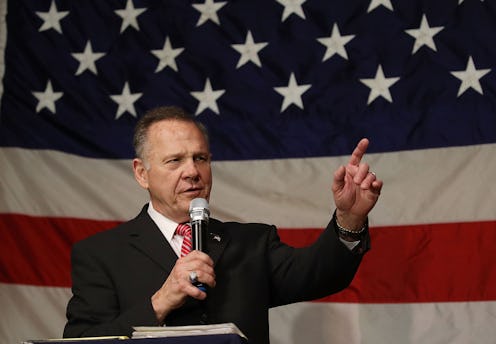
Starting at 7 a.m. local time on Tuesday, voters in Alabama will choose between two senatorial candidates: Republican Roy Moore and Democrat Doug Jones. The campaign has been a media sensation, challenging political ethics and capturing public attention. But by 7 p.m. on Tuesday, the Alabama special Senate election will end, leaving a historic race in its wake.
The campaign has been characterized by scandal since a Nov. 9 report in The Washington Post revealed a series of sexual harassment and assault allegations against Moore, a former Alabama state judge. The shocking report was only the first of its kind. By the middle of November, as many as eight women had accused Moore of molestation, and/or romantically pursuing them at a young age. Moore has defended himself, consistently denying the allegations, describing them as "dirty politics" and "ritual defamation." He has also denied knowing any of the accusers, and has painted the reports as a liberal conspiracy against he and his campaign.
Despite all of this, he by and large enjoys support from the conservative political establishment. When allegations against Moore first came out, the Republican National Convention withdrew its support for Moore, but when President Donald Trump officially endorsed him, the national committee resumed funding the former judge's campaign.
Whether or not Trump would come out in favor of the Republican senatorial candidate was a point of speculation in the weeks following the allegations. In the immediate aftermath, White House Press Secretary Sarah Huckabee Sanders said that the President believed "Moore will do the right thing and step aside" if the accusations "were true." But on Monday, Dec. 4, just a week out from the election, Trump officially tweeted his support for the scandal-embroiled senatorial candidate. He reasoned that Republicans needed the votes in Congress.
"Democrats refusal to give even one vote for massive Tax Cuts is why we need Republican Roy Moore to win in Alabama," he said. "We need his vote on stopping crime, illegal immigration, Border Wall, Military, Pro Life, V.A., Judges 2nd Amendment and more. No to Jones, a Pelosi/Schumer Puppet!"
In the days leading up to the election, reports surfaced that Trump's voice would be used in pro-Moore robocalls, which are scheduled to go out on Monday, one day before the election. Repeating what he has already said in several Tweets, Trump will be heard telling Alabama voters that he "need[s] Alabama to go vote for Roy Moore."
"I’m going to make America safer and stronger and better than ever before," Trump says on the pre-recorded phone call. "We need that seat. We need Roy voting for us."
Jones, the Democratic candidate has largely avoided the national headlines which his opponent has occupied almost daily for over a month. But while Jones has largely served as Moore's foil, he has reportedly campaigned at a breakneck pace, making 217 appearances in the last two months. Moore, meanwhile, has publicly appeared less than 10 times in the past month alone. While this could potentially indicate campaign confidence, Jones accused his opponent of hiding.
"Let me ask you a question," Jones said to a crowd at a rally on Sunday. "What do you think about a United States senator that stays in hiding and won't even talk to the media and won't talk to his constituents? Y'all have had enough of federal officials up here that won't talk or hold meetings."
Most polls show Jones trailing Moore by three or four points, but considering margins of error, and given the odd circumstances surrounding the election, it's impossible to tell who is likely to win. Senatorial campaign polls notoriously have large margins of error, and since Tuesday's election is off-cycle and special, it's difficult to predict which voters will show up at the polls. The election results are expected later that night.